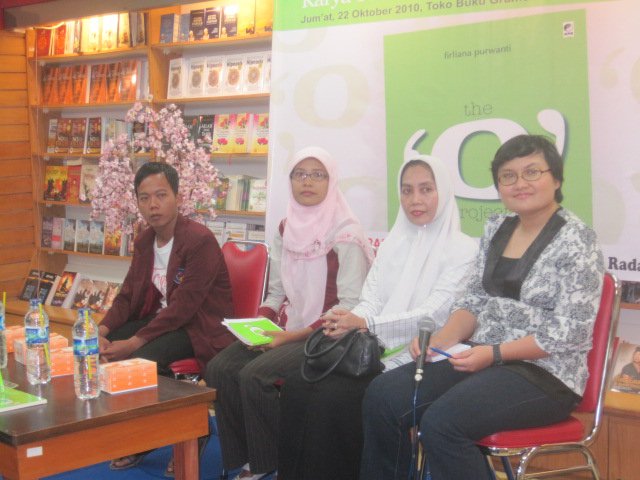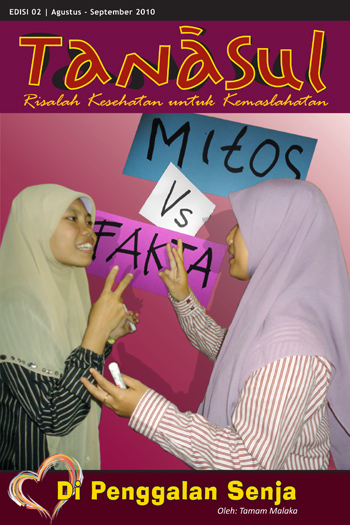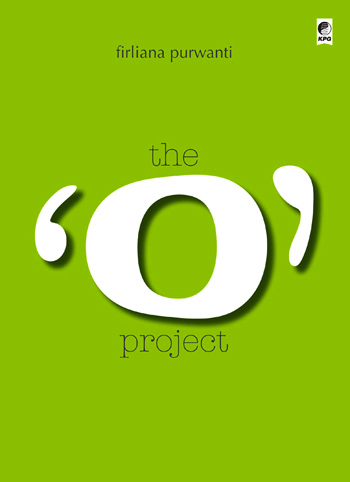Muslim women gather in a Cirebon bookshop to discuss topics including lesbianism and female circumcision
Joanne McMillan and Alimah
On a Friday afternoon in late 2010, a crowd has gathered in Gramedia bookshop in Cirebon, West Java to participate in a discussion with expert panellists about The ‘O’ Project, one of the most talked-about books of the year. The ‘O’ in the title is for orgasm and the book, by activist Firliana Purwanti, is based around conversations with women from diverse backgrounds about their experiences of sexual orgasm. These conversations took place in Aceh, Jakarta and Surabaya between April and December 2009, and include frank discussion on controversial topics such as female circumcision, virginity, polygamy, lesbianism, sex work, HIV/AIDS and masturbation.
Many Indonesians, particularly those from devout Muslim backgrounds, would consider it taboo for women to speak openly about their experiences of sexual pleasure. Like The ‘O’ Project, the afternoon’s event aimed to confront that taboo head on and in doing so inspire critical discussion about sexuality and related social justice issues. Participants in the event, most of whom are affiliated with pesantren (Indonesia’s traditional academies of Islamic studies), seem happy to embrace the spirit of the book, and speak frankly (or at least listen to others speak frankly) about the issues it raises. It’s a lively discussion, provoking a lot of questions, giggles and sometimes raucous laughter from participants.
On masturbation
The event was organised by the executive student body of a local Islamic tertiary college, Fahmina Institute for Islamic Studies (ISIF), which has strong links to the local pesantren community. Joining the author of The ‘O’ Project, on the expert panel were Nyai Masriyah Amva, the head of Pondok Jambu Pesantren and herself a bestselling author, and Rozikoh Sukardi, the Manager of Islam and Gender Programs from Fahmina Institute, the nongovernmental organisation behind ISIF. Most audience members also had a pesantren background. It is not surprising then, that a large part of the afternoon’s discussion centred on how the issues and ideas raised in The ‘O’ Project relate to Islamic teachings and the lives of devout Muslims.
The ‘O’ Project was not written with the pesantren community specifically in mind and Firli, though Muslim, is not from a pesantren background. Nevertheless, both she and her fellow panellists agree that the book is relevant to the pesantren community. Firli explained that confronting myths and taboos about women’s sexuality was a way for her to provoke discussion about inequality in sexual relationships. ‘I think the stories about orgasm in this book, told by women who have found the courage to break through taboo, can help other women who have experienced discrimination or injustices in sexual relationships.’ Achieving equality for women in sexual relationships, she argues, is an important aspect of achieving equality for women more broadly. ‘If discrimination in the bedroom can be eliminated then discrimination in the public arena will be easier to overcome’, she said.
Nyai Mas, from Pondok Jambu pesantren, agrees that this underlying message about the need for equality in sexual relationships is highly relevant to people from pesantren backgrounds. ‘I feel that we in the pesantren community really need this book,’ she said. ‘I agree with the author that women often do not obtain justice including behind closed doors such as in the bedroom. This book would be of benefit to couples by helping them to respect and appreciate each other’s point of view.
But although Nyai Mas approves of The ‘O’ Project’s message about the need for gender equality in sexual relationships, she does not agree with Firli about everything. During the discussion, a young woman in the audience called Cici asked a question about masturbation. Cici has attended a pesantren and has never masturbated – indeed, she admitted that before reading The ‘O’ Project, she hadn’t even really understood what the word meant. When Cici asks the panellists about how masturbation is seen from a religious point of view, Firli and Nyai Mas give very different responses.
Firli does not claim to be an authority on religious teachings, but she argues that masturbation is both natural and an important way for women to get to understand their bodies. Nyai Mas does not agree. Although she stresses that it is not her place or her right to tell other people they may not masturbate, she believes that masturbation is an example of deviant sexual behaviour and thus is not permitted according to Islamic teaching. ‘This is religious doctrine,’ she argued. Despite living alone since her husband’s death in 2004, Nyai Mas says she has no need to masturbate. ‘Of course, I still want to experience orgasm, but I’ve replaced sexual orgasm with spiritual orgasm. If I’m bored and have nothing to do, I’d rather just read a book’ she says.
Teaching about sex
One of the topics raised in the discussion was the issue of whether sex education should be compulsory for school students. The issue became topical in Indonesia in 2010 following the sex-tape scandal involving pop singer Nazril Irham (better known as Ariel, from the band Peterpan) and concern about school students accessing the sex tapes online. At the time, Indonesia’s Education Minister, Mohammad Nuh, rejected the idea that sex education should become part of the curriculum in secondary schools, saying that young people will learn about sex ‘naturally’. His comments were criticised by a number of sex education advocates and led to public debate about the issue of sex education in schools.
Elements of sex education are, in fact, already taught in many Indonesian schools – including some pesantren-based schools – in subjects such as religion, biology and citizenship. However, research shows that young people’s knowledge in sexual matters is poor, particularly in devout Muslim families.
Firli says that the lack of knowledge about sex among young people was one of the factors that motivated her to write The ‘O’ Project. She believes that comprehensive sex education for young people would help prevent pre-marital pregnancies, as well as other problems such as sexual violence and sexually transmitted diseases. This, she stresses, does not necessarily have to conflict with religious beliefs or morality. ‘Sex education doesn’t mean teaching young people how to have sex,’ said Firli. ‘It means teaching about equality, autonomy and the rights of both parties in sexual relationships.’
Panellist Rozikoh, from Fahmina Institute, agrees with Firli about the need for young people to receive sex education. According to Rozikoh, recent research conducted by Fahmina shows that young people in local pesantren communities have poor understanding of their sexual health and biology. Fahmina’s research found that their knowledge is often based on myths. For example, many pesantren students believed that men have a stronger libido than women, that women always experience bleeding the first time they have sexual intercourse and even that eating pineapple while menstruating can make you pregnant. Fahmina’s research also found that pesantren students are often confused about what is or is not permitted according to Islam because of differences in interpretation of texts by their own teachers as well as by local religious leaders and well-known Islamic scholars.
 |
The panel participantsAlimah |
 |
One of the ways the Fahmina Institute is trying to improve awareness of sexual health issues among young people in local pesantren communities is through their magazine Tanasul, which means ‘reproduction’ in Arabic. The magazine contains feature articles about local pesantren and news about sexual health issues as well as advice from experts and local community figures. There is also a regular column in which a young female doctor answers readers’ questions about medical issues and another column in which local Islamic scholars analyse religious texts used in pesantren that discuss issues relevant to sex and health.
According to Maimunah Mudjahid, one of the people behind Fahmina’s program, Tanasul aims to provide a source of information about sex and other issues relevant to young Muslims. ‘Usually, young people seeking information only have a choice between western-style media and conservative religious media,’ said Maimunah. ‘We want to offer a third alternative that reflects the modern realities faced by young people without losing sight of our cultural and religious identity.’
Anything but pornography
Asked what she thinks of The ‘O’ Project, Maimunah, who grew up in Buntet Pesantren near Cirebon, replied: ‘I enjoyed reading the book and I think it’s important not only for women to read it, but also men. The author is a human rights advocate and she uses the book to press for the rights of marginalised groups, such as lesbians and prostitutes, who are stigmatised in Indonesian society.’
But Maimunah is also concerned that the book’s discussion of controversial material may alienate some readers from pesantren backgrounds. ‘Advocating just treatment for stigmatised groups is laudable. My only worry is that for women from devout Muslim communities, the book may give the impression that only immoral or disobedient women demand their right to orgasm and equality in sexual relationships. I want them to understand that every woman has the right to enjoy sex.’
Marzuki Wahid, the Director of Fahmina Institute, agrees with Maimunah that the subject matter of The ‘O’ Project may be off-putting for some devout Muslims. ‘This book at first gives the impression that it is pornographic,’ he says. ‘But when you read it, it turns out that it is not pornographic at all.’ In fact, he argues, the overall message of The ‘O’ Project is instructive for Muslims.
‘This book shows us that women often do not experience orgasm as a result of an imbalance in relations between men and women, especially in home life’, says Marzuki. ‘Islam teaches that good and equal relations between husband and wife are obligatory. If inequality in sexual relations can impact negatively on family relations, then it should be considered obligatory for Muslim couples to ensure that both partners have the opportunity to enjoy sex and experience orgasm.’
It’s an argument that would be popular with the participants in this event. They may not agree with everything Firli has written about in The ‘O’ Project – indeed, many of the subjects the book discusses may conflict with their religious beliefs. But the enthusiasm with which both panellists and audience members have engaged in the discussion suggests that there is plenty of appetite in the pesantren community for knowledge and debate about sexual health, morality, religion and – above all perhaps – the benefits of satisfying sex.
Joanne McMillan (jo_mcmillan@yahoo.com) is a freelance writer and researcher based in Canberra, Australia. From 2007-2009 she was placed as a translator and editor at Fahmina Institute by Australian Volunteers International.
Alimah (alimah.fauzan@gmail.com), worked as a journalist in Fahmina Institute‘s Centre of Data, Information and Media from 2008-2010. She is now a Fellow at Paramadina Graduate School in Jakarta, majoring in political communication.













